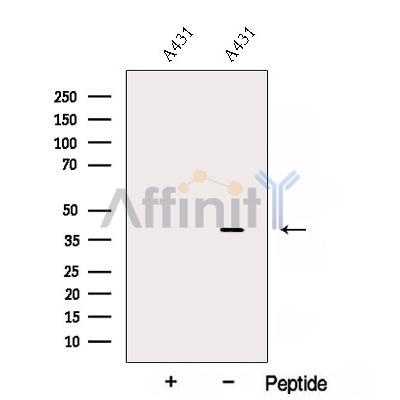AMD1 Antibody - #DF12822
| Product: | AMD1 Antibody |
| Catalog: | DF12822 |
| Description: | Rabbit polyclonal antibody to AMD1 |
| Application: | WB IF/ICC |
| Reactivity: | Human, Mouse, Rat |
| Prediction: | Pig, Bovine, Sheep, Rabbit, Dog |
| Mol.Wt.: | 38 kDa; 38kD(Calculated). |
| Uniprot: | P17707 |
| RRID: | AB_2845783 |
Related Downloads
Protocols
Product Info
*The optimal dilutions should be determined by the end user. For optimal experimental results, antibody reuse is not recommended.
*Tips:
WB: For western blot detection of denatured protein samples. IHC: For immunohistochemical detection of paraffin sections (IHC-p) or frozen sections (IHC-f) of tissue samples. IF/ICC: For immunofluorescence detection of cell samples. ELISA(peptide): For ELISA detection of antigenic peptide.
Cite Format: Affinity Biosciences Cat# DF12822, RRID:AB_2845783.
Fold/Unfold
Adenosylmethionine decarboxylase 1; AdoMetDC; AMD1; DCAM_HUMAN; EC 4.1.1.50; FLJ26964; S adenosylmethionine decarboxylase 1; S adenosylmethionine decarboxylase proenzyme; S-adenosylmethionine decarboxylase beta chain; SAMDC;
Immunogens
A synthesized peptide derived from human AMD1, corresponding to a region within N-terminal amino acids.
- P17707 DCAM_HUMAN:
- Protein BLAST With
- NCBI/
- ExPASy/
- Uniprot
MEAAHFFEGTEKLLEVWFSRQQPDANQGSGDLRTIPRSEWDILLKDVQCSIISVTKTDKQEAYVLSESSMFVSKRRFILKTCGTTLLLKALVPLLKLARDYSGFDSIQSFFYSRKNFMKPSHQGYPHRNFQEEIEFLNAIFPNGAAYCMGRMNSDCWYLYTLDFPESRVISQPDQTLEILMSELDPAVMDQFYMKDGVTAKDVTRESGIRDLIPGSVIDATMFNPCGYSMNGMKSDGTYWTIHITPEPEFSYVSFETNLSQTSYDDLIRKVVEVFKPGKFVTTLFVNQSSKCRTVLASPQKIEGFKRLDCQSAMFNDYNFVFTSFAKKQQQQQS
Predictions
Score>80(red) has high confidence and is suggested to be used for WB detection. *The prediction model is mainly based on the alignment of immunogen sequences, the results are for reference only, not as the basis of quality assurance.
High(score>80) Medium(80>score>50) Low(score<50) No confidence
Research Backgrounds
Essential for biosynthesis of the polyamines spermidine and spermine. Promotes maintenance and self-renewal of embryonic stem cells, by maintaining spermine levels.
Is synthesized initially as an inactive proenzyme. Formation of the active enzyme involves a self-maturation process in which the active site pyruvoyl group is generated from an internal serine residue via an autocatalytic post-translational modification. Two non-identical subunits are generated from the proenzyme in this reaction, and the pyruvate is formed at the N-terminus of the alpha chain, which is derived from the carboxyl end of the proenzyme. The post-translation cleavage follows an unusual pathway, termed non-hydrolytic serinolysis, in which the side chain hydroxyl group of the serine supplies its oxygen atom to form the C-terminus of the beta chain, while the remainder of the serine residue undergoes an oxidative deamination to produce ammonia and the pyruvoyl group blocking the N-terminus of the alpha chain.
Belongs to the eukaryotic AdoMetDC family.
Research Fields
· Metabolism > Amino acid metabolism > Cysteine and methionine metabolism.
· Metabolism > Amino acid metabolism > Arginine and proline metabolism.
· Metabolism > Global and overview maps > Metabolic pathways.
References
Restrictive clause
Affinity Biosciences tests all products strictly. Citations are provided as a resource for additional applications that have not been validated by Affinity Biosciences. Please choose the appropriate format for each application and consult Materials and Methods sections for additional details about the use of any product in these publications.
For Research Use Only.
Not for use in diagnostic or therapeutic procedures. Not for resale. Not for distribution without written consent. Affinity Biosciences will not be held responsible for patent infringement or other violations that may occur with the use of our products. Affinity Biosciences, Affinity Biosciences Logo and all other trademarks are the property of Affinity Biosciences LTD.


